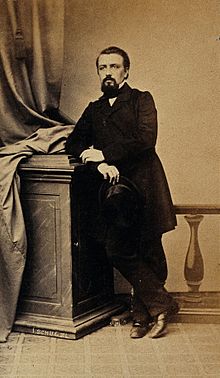Nikolaus Friedreich facts for kids
Quick facts for kids
Nikolaus Friedreich
|
|
|---|---|
 |
|
| Born | 1 July 1825 |
| Died | 6 July 1882 (aged 57) |
| Nationality | German |
| Known for | Friedreich's ataxia |
| Scientific career | |
| Fields | Neurology |
Nikolaus Friedreich (born July 1, 1825, in Würzburg, Germany – died July 6, 1882, in Heidelberg, Germany) was an important German doctor. He was a pathologist, which means he studied diseases and how they affect the body. He was also a neurologist, a doctor who specializes in the brain, spinal cord, and nerves. Nikolaus Friedreich came from a family of doctors; his father and grandfather were also physicians.
Contents
A Doctor's Journey
Nikolaus Friedreich started his medical studies at the University of Würzburg. He learned from famous professors like Albert von Kölliker, who studied how the body works, and Rudolf Virchow, a well-known pathologist.
Later, Friedreich became a professor himself at Würzburg. In 1858, he moved to the University of Heidelberg. There, he became a professor of pathology and therapy, teaching about diseases and their treatments. He stayed at Heidelberg for the rest of his career. Some of his students, like Wilhelm Heinrich Erb, also became famous doctors.
Discovering Diseases
Nikolaus Friedreich spent a lot of time studying how diseases affect the body. He researched conditions that weaken muscles and problems with the spinal cord and brain.
He is best known for discovering a disease called "Friedreich's ataxia" in 1863. This is a genetic disease, meaning it can be passed down in families. It affects the spinal cord, causing problems with a person's speech, balance, and coordination. People with Friedreich's ataxia might have trouble walking steadily.
Conditions Named After Him
Several medical conditions are named after Nikolaus Friedreich because he was the first to describe them or made important discoveries about them.
Friedreich's Ataxia
- Friedreich's ataxia: This is a genetic condition that affects the nervous system. It causes people to have an unusual way of walking and problems with coordination.
Other Conditions
- Friedreich's disease (also called paramyoclonus multiplex): This is a genetic condition where people have sudden, brief muscle twitches, especially in their arms and legs.
- Friedreich's foot (or pes cavus): This describes feet that have unusually high arches.
- Friedreich-Auerbach disease: This condition causes certain parts of the body, like the tongue, ears, and some facial features, to grow larger than normal. It is named with another anatomist, Leopold Auerbach.
See also
 In Spanish: Nikolaus Friedreich para niños
In Spanish: Nikolaus Friedreich para niños
- German inventors and discoverers
 | Kyle Baker |
 | Joseph Yoakum |
 | Laura Wheeler Waring |
 | Henry Ossawa Tanner |

